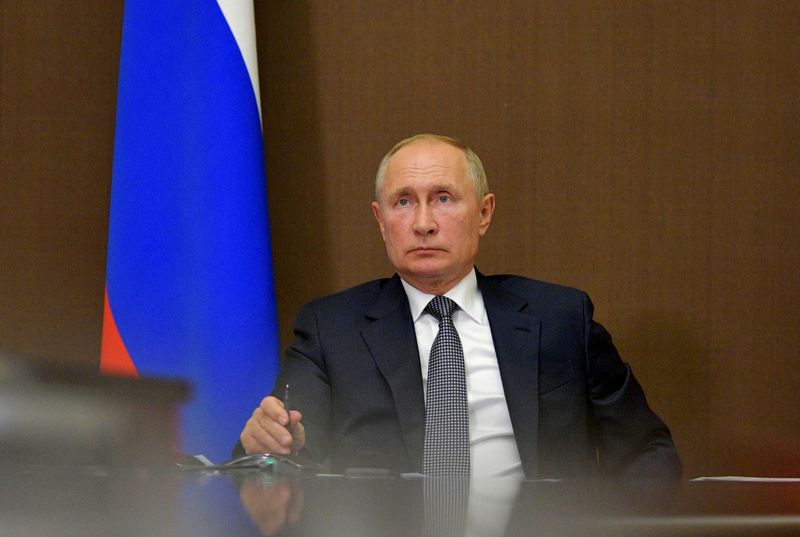By Mark Trevelyan and Gabrielle Tétrault-Farber
(Reuters) - Russian President Vladimir Putin has fired off one appeal after another for a ceasefire between Azerbaijan and ethnic Armenian forces, but the new eruption of their old conflict highlights Moscow's declining leverage and the rising influence of Turkey.
Russia's repeated calls - the latest one issued jointly on Thursday with U.S. President Donald Trump and France's Emmanuel Macron - have been met with a volley of defiant rhetoric from Ankara, which has thrown its weight more than ever before behind its ally Azerbaijan.
Turkish President Tayyip Erdogan said on Thursday it was unacceptable that Moscow, Paris and Washington were involved in seeking a solution to the Nagorno-Karabakh conflict, having neglected problems there for 30 years.
The situation presents a sharp contrast with 2016, when Russia was instrumental in halting a previous flare-up of fighting after just four days.
The difference is that Erdogan, who has bolstered Turkey's already close links to Azerbaijan by investing heavily
there and buying Azeri gas, has said Ankara backs its ally "with all its resources and heart" in its ambition to recover lost territory.
"Azerbaijan has got more or less explicit Turkish support and feels, I think, more confident and capable of sustaining a longer conflict and is less inclined to or less vulnerable to peace enforcement from Russia," said Laurence Broers, Caucasus programme director at Chatham House think-tank in London.
"I think there's a sense in which Russia's services at the moment are not needed by Baku. It’s going for it."
RUSSIAN FRUSTRATION
Russia has an urgent interest in finding a solution to the violence over Nagorno-Karabakh, a mountainous enclave inside Azerbaijan that is populated overwhelmingly by ethnic Armenians and broke away from Baku's control as the Soviet Union collapsed in the early 1990s.
Moscow has good relations with both Armenia and Azerbaijan, and no desire to see a full-scale war break out on its southern doorstep with the potential to drag in neighbours such as Turkey and Iran.
Putin and his foreign minister Sergei Lavrov have been issuing statements and working the phones. Since fighting broke out on Sunday, the Kremlin has made public two conversations between Putin and Armenian Prime Minister Nikol Pashinyan, although none with Azeri President Ilham Aliyev or with Erdogan.
Russian frustration was evident on Wednesday when Lavrov had told the Azeri and Armenian foreign ministers to halt "provocative warlike rhetoric". Soon afterwards, his ministry condemned what it said was the presence of Syrian and Libyan fighters in the conflict zone and demanded the withdrawal of "foreign terrorists and mercenaries".
That appeared to point the finger at Turkey, which denied a Reuters report on Monday that it was sending in fighters from areas of Syria's north that it controls.
The potential for a devil's brew of fighters from different war zones is a source of alarm for Moscow, which has struggled for decades with Islamist insurgents in its own southern regions of Chechnya and Dagestan.
"What we're seeing is a sort of bleeding together of Middle East conflict dynamics with the South Caucasus," said Neil Melvin, director of international security studies at the RUSI think-tank in London.
WORKING WITH ERDOGAN?
Melvin pointed to two scenarios for a possible halt to the conflict.
While Azerbaijan has little chance of over-running Armenian forces entirely, it might score sufficient tactical gains to be able to declare victory and then use them as leverage in talks.
Failing that, a further escalation could force some kind of international intervention. In that case, with the United States distracted by the Nov. 3 presidential election and Russia struggling to gain traction by itself, Putin might be forced to engage with Erdogan.
Russia and Turkey are already backing opposite sides in conflicts in Syria and Libya, but the two leaders have a pragmatic relationship and have overcome past crises, such as Turkey's downing of a Russian warplane on the Syrian border in 2015.
"Putin has been trying for the last few years to dance tango with Erdogan in the field of anti-American policy, to split Turkey from NATO, to sell Turkey its weapons, sell its gas to Turkey, and so on," said Russian analyst Dmitry Oreshkin.
"In that sense Putin openly and consistently treads softly with Erdogan, and in some people’s opinion too softly."
Melvin said talking to Turkey might be the most viable way to achieve immediate progress, but it would require Putin to accept that Russia's influence had diminished in a strategically important area of the former Soviet Union.

"This may be what ultimately Erdogan's strategy is, to use the conflict to springboard Turkey to have a larger regional role," he said. "But it's a very dangerous game."